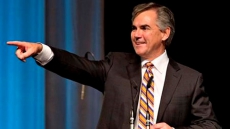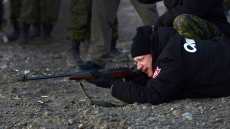TORONTO - Some recent suicides among Canada's police officers have mental health advocates redoubling calls for more aggressive government action and greater public sympathy for the emotional well-being of law enforcement professionals.
Traumatic encounters on the job coupled with stressful working conditions and challenging cultures of silence leave police vulnerable to mental health stress, they said, arguing the issue is comparable in scope to the more high-profile challenges the country's military community faces.
The most recent apparent case of suicide, according to multiple media reports, was Staff Sgt. Kal Ghadban, a 22-year veteran of the Ottawa police force whose body was found in his office last weekend.
Canada does not have a central database to track police suicides, but a recent effort to document the problem has some people drawing striking parallels.
The Tema Conter Memorial Trust, an organization that works to raise awareness of the mental health concerns faced by first responders, began logging police suicides in late April.
In just over five months, the group said it recorded 12 instances where actively serving officers took their own lives. The group said each case was verified with individual police forces or other first responders before being formally recorded as a suicide.
Tema Executive Director Vince Savoia said the numbers are comparable to a sharp spike in military suicides last year that had the Department of National Defence fielding harsh criticism from the opposition.
In a three-month stretch from November 2013 to February 2014, the military recorded 10 confirmed suicides.
Savoia said the comparable numbers are not altogether surprising considering the similar challenges faced by both soldiers and cops.
Both groups tend to attract driven, ambitious people who are averse to admitting weakness.
This natural reticence becomes enhanced by an internal culture that discourages signs of perceived weakness and is further reinforced by a more broad-based social stigma toward those struggling with mental illness, he said.
"The expectation within society is that this is a career that police officers choose, and as such they should be prepared," Savoia said in a telephone interview. "Far too often I've heard the comment, 'you'll get no sympathy from me because that's the career you chose and you should have known that you'd be encountering these sorts of situations."
The challenges faced by police, experts said, are compounded by a piecemeal system with no central regulation.
There is no national initiative to track suicides within the country's numerous police forces or coordinate efforts to treat mental illness within their diverse ranks, said Terry Coleman of the Police Mental Health Liaison, a research group originally established by the Canadian Association of Chiefs of Police.
Coleman, the former top cop with the police service in Moose Jaw, Sask., says he has read research indicating that suicide rates among police are lower than among the general public, but does not deny the issue is worthy of greater scrutiny. He said mental health within the law enforcement community is a particularly complex field that involves much more than grappling with the after-effects of violent crimes.
Certainly post-traumatic stress can play a role as it did in the death of retired RCMP Cpl. Ken Barker, who died by suicide in July.
Barker's wife told the Winnipeg Free Press that her husband, who was one of the officers on the scene when a man beheaded a fellow passenger on a Greyhound bus in 2008, had struggled with PTSD for years after the incident.
But Coleman said other factors inherent to police work can take an equally heavy toll on an officer's emotional health.
Cops working arduous hours in remote detachments may be more prone to mental distress, he said, adding the strain can also accumulate through more routine demands.
"It can be everything from the management and supervisory style, archaic or impractical policies of an organization, just the physical workplace environment. It sounds mundane when you spell them out one at a time, but collectively they cause all sorts of stress in a workplace," Coleman said.
If monitoring suicide rates among Canada's police is a haphazard effort, offering treatment is even more so.
Savoia said each individual police force is responsible for providing its own mental health supports, which often amount to an employee assistance program offering participants a limited number of telephone consultations.
Some offer benefits plans that cover only a handful of sessions with community psychologists, forcing those seeking help to join lengthy waiting lists to seek free psychiatric assistance. Others forces offer peer support groups for officers to discuss issues amongst themselves.
Still others, such as the RCMP, have opted to employee mental health professionals on staff in an effort to curb what is acknowledged as a genuine problem.
In a newly developed mental health strategy released earlier this year, the RCMP said 38 per cent of long-term sick leaves among its regular and civilian members were caused by mental illness.
RCMP say 16 serving members and 15 retired employees took their own lives between 2006 and 2014.
Assistant Commissioner Gilles Moreau said the nearly dozen psychologists on staff are there to help coordinate a member's recovery plan.
If someone does not want to make use of the force's employee assistance program, which is administered by Health Canada, force psychologists can connect them to community resources for additional treatment.
But Moreau also highlighted a common objection to such internal resources by saying patient confidentiality is not assured.
"We have due diligence responsibilities as the employer to make sure that the police officers we send out on the street are healthy both physically and mentally," Moreau said.
"We cannot ask our members to go out and get psychological services out in the community without having some form of report come back to the organization to tell us whether that person is healthy and fit for duty or not fit for duty. That's the responsibility we have."
Savoia said such concerns are top of mind among officers who fear the stigma of mental illness will scuttle their career prospects or leave them feeling more marginalized among their peers.
He said provincial governments could improve the situation by increasing funding to make local mental health resources more accessible and affordable.
But the most important drivers of change, he said, must be the attitudes of police themselves.
Moreau agreed, saying the key piece of the RCMP's new mental health strategy is to have members overcome the sometimes crippling stigma that can sometimes end in tragedy.
"That's the big thing is to say, 'yes, you know what, I've had life happen to me. . . . It will have an impact on you. Some people have more resilience, but if you do not have that resilience, it is ok to go and seek help?"





